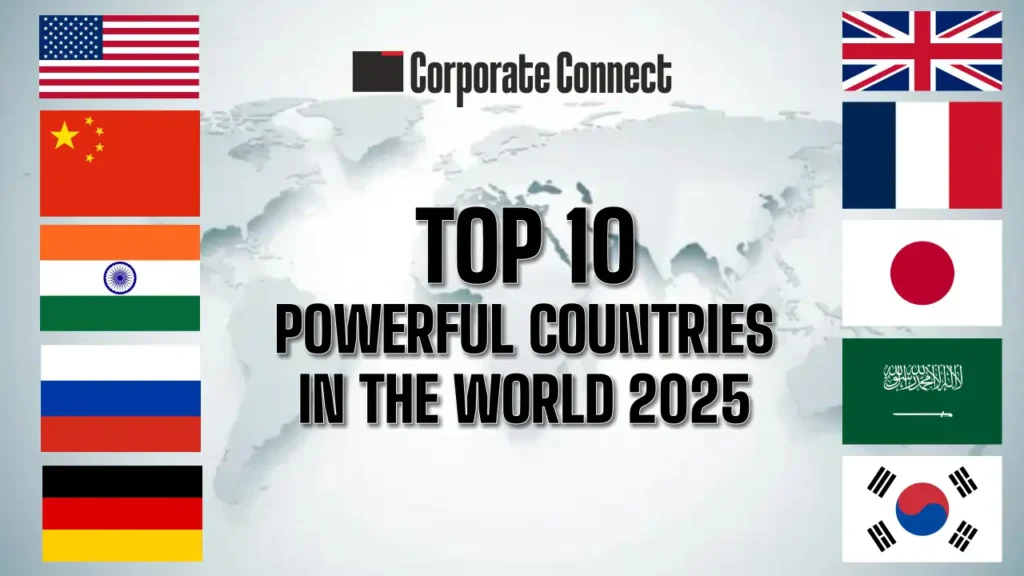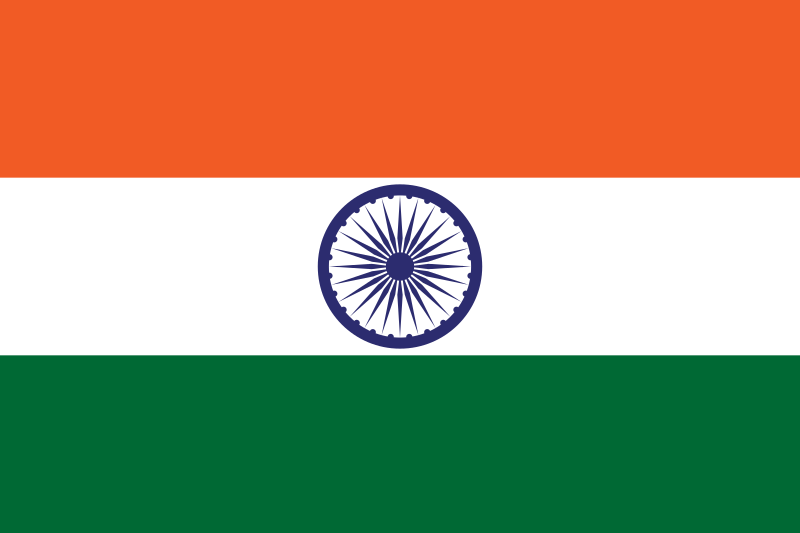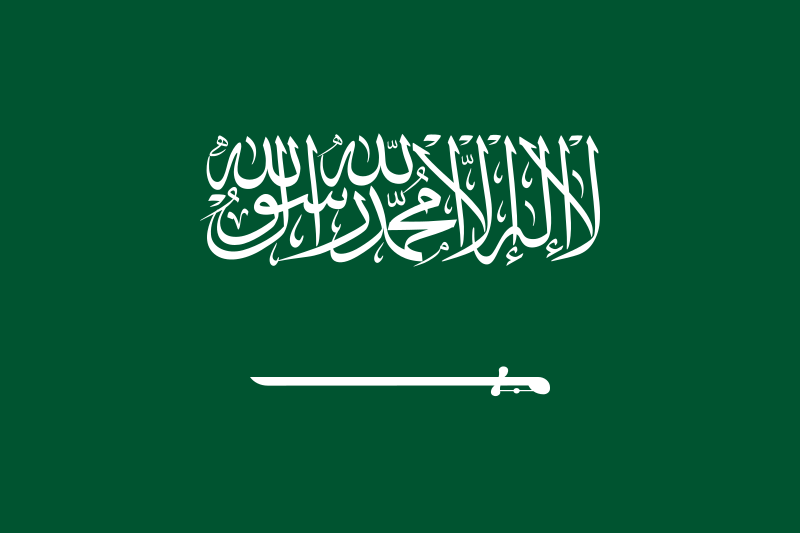Top 10 Powerful Countries in the World 2025
Every nation in the world has unique characteristics that make it stand out from the others. Nonetheless, over time, a small number of countries have become incredibly strong in a variety of fields. Studying which countries have the most power is of significant interest because of their enormous impact on the modern world, which is changing quickly. In terms of their economic might, cultural influence, and military might, these countries have advanced remarkably. As prominent world leaders, they also have a big impact on foreign policy, geopolitical dynamics, and economic trends. Making an impression is the ultimate goal.
To find out more about a comprehensive list of the top 10 powerful countries in the world in 2025, along with the main elements that enabled them to achieve those rankings, continue reading.
Top 10 Powerful Countries: Here is the List
In a world where states exercise their influence on many fronts, the idea of power is paramount. Studying which countries have the most power is of significant interest because of their enormous impact on the modern world, which is changing quickly. Now, without further ado, let’s review the list:
01. USA
For a very long time, the United States has been at the top of the list of the ten most powerful nations. The nation’s military prowess is among the primary elements that have helped it grow into a superpower. Other important factors that have a significant influence are strong leadership and economic stability. You should know that the United States spends the most on the military and has the largest economy in the world, with a 2020 GDP of $20.93 trillion.
02. China

China is the second most powerful country in the world, with growing economic might, military force, and cultural influence. It boasts the second-largest military spending in the world, with more than a million active soldiers and the second-largest economy in the world (GDP of over $14 trillion). China is home to some of the largest and most well-known technological companies in the world, including Alibaba and Huawei. Most of the things we use on a daily basis are labeled “Made in China” since China is the world’s largest exporter.
03. India
- Capital: New Delhi
- Dialing code: +91
- Demonym(s): Indian; others
- GDP (nominal): 2023 estimate
Credit image: India – Wikipedia
Due in part to its massive population and expanding economic power, India’s influence on the global scene has been steadily increasing in recent decades. There are over 1.2 billion speakers of several languages there, some of which are considered dialects by speakers of other Indian languages. Due in part to its enormous population and growing economic power, India has gradually extended its influence on the world in recent decades. As a result of this expansion, India’s GDP is expected to rank third globally by 2030.
04. Russia
- Capital: Moscow
- Currency: Russian Ruble
- Population: 14.34 crores (2021)
- Dialing code: +7
In addition to possessing a strong military, Russia, the third-most powerful country in the world, has enormous cultural and economic sway. Its military budget is the third largest in the world, and it now has over a million soldiers on active service. With a GDP of about $1.69 trillion, it also has the ninth-largest economy in the world. Among the important academic and cultural establishments that call Russia home are the Kremlin and the Russian Academy of Sciences. Among the 10 most powerful nations in the world, it is now ranked fourth.
05. France
- Capital: Paris
- Currency: EURO
-
France Dialing code:+33
Because France is the dominant political force in the European Union, it barely beats the United Kingdom for sixth place. France is a major player in the automotive, rail, and aerospace industries. France is a great place to vacation and a manufacturer of luxury goods, and it has universal healthcare and one of the greatest standards of living in the world. The French economy, which is among the best in the world, combines the public and private sectors. Its GDP is $2.72 trillion, and its population is 126 million.
06. Japan
- Capital: Tokyo
- Currency: Japanese yen (¥)
- GDP (nominal): 2023 estimate

Given that Japan has the third-largest economy in the world, its influence has recently been concentrated primarily on the scientific and economic fields. The nation, which is currently ranked among the top 10 most powerful in the world, was originally politically united in the late fourth and early fifth centuries B.C. One of the nations with the most advanced technologies is Japan. Its GDP is a solid $5.06 trillion, and its population is 126 million. Since its political and military might is still relatively small, Japan, the world’s third-largest economy, has recently concentrated most of its power on the economic and technological fronts.
07. United Kingdom
- Capital: London
- Calling code: +44
- Currency: Pound sterling (GBP)

With a $2.83 trillion GDP, the UK has a big influence on industry, politics, science, and culture around the world. Its economy is the sixth largest in the world, and it exports a lot of goods and services. It is a member of the European Union and actively engages in international affairs. Because of its strong economy, technological prowess, and profound cultural influence, the UK remains a dependable middle power on the global stage.
08. Brazil
- Capital: Brasília
- Official language: Portuguese
- Dialing code: +55
- Currency: Real (R$) (BRL)
- Demonym(s): Brazilian

Because of its enormous population and land area, Brazil, the fifth-largest nation in the world, remains the most powerful nation in Latin America. Its Amazon Forest, which is home to a diverse range of species and an amazing natural setting, is its most famous feature. In recent years, they have had significant economic and political success. The $1.88 trillion GDP of the country is mostly derived from the mining, manufacturing, and service industries.
09. Canada

Canada has a large geographic influence and a high degree of security and stability despite having the fewest citizens among the top ten most powerful countries in the world. Canada is one of the nations that draws the greatest number of immigrants because of its superiority in a variety of areas, such as adventure, cultural impact, agility, entrepreneurship, social purpose, and quality of life. They have 38 million people living there, and their GDP is $1.74 trillion. Among the ten most powerful countries in the world, it ranks ninth.
10. Saudi Arabia
- Capital: Riyadh
- Currency: Saudi Riyal
- Area: 2.15 million km²
- GDP (nominal): 2023 estimate
- Founded: 23 September 1932
Saudi Arabia, which is located on the southern coast of the Arabian Peninsula, contains some of the most convenient and plentiful hydrocarbon resources in the world, which contribute to its substantial economic influence globally. As the site of the holiest places in Islam, the country also has a big cultural impact on people worldwide. Saudi Arabia’s $793 billion GDP has a big effect on the world economy. It has some of the world’s best and most accessible hydrocarbon resources. Being the holiest place in Islam, the nation has a significant cultural influence on people worldwide.
5 Superpower Countries in 2025
-
United States
Considered the world’s most powerful country, the US has unmatched economic and military power.
-
China
The world’s second-largest economy, China has a strong military and is investing in its naval, airpower, and land warfare capabilities.
-
Russia
Despite its war with Ukraine, Russia remains a powerful country due to its size, borders, energy and manufacturing industries, cultural contributions, and space exploration history.
-
United Kingdom
A highly developed nation with considerable international influence in economics, politics, science, and culture.
-
Japan
Japan has a strategic advantage due to its major ports and is the second-largest holder of helicopter carriers in the world.
-
IndiaIndia has a large population, a strong network of educational institutions, a booming high tech sector, and an established democracy.
Top 50 Powerful Countries in 2025
- United States
- China
- India
- Russia
- Germany
- United Kingdom
- France
- Japan
- Saudi Arabia
- South Korea
- Canada
- Australia
- Italy
- Brazil
- Turkey
- Israel
- United Arab Emirates
- Indonesia
- Spain
- Mexico
- Netherlands
- Sweden
- Switzerland
- Norway
- Qatar
- Singapore
- South Africa
- Pakistan
- Egypt
- Iran
- Thailand
- Malaysia
- Vietnam
- Philippines
- Argentina
- Poland
- Ukraine
- Greece
- Colombia
- Chile
- Nigeria
- Bangladesh
- Portugal
- Kazakhstan
- Iraq
- Belgium
- Denmark
- Austria
- New Zealand
- Czech Republic
Bottom Line
The nations’ relative power is always changing. The variables that determine a nation’s power are numerous and constantly changing. The United States, China, Russia, Germany, the United Kingdom, South Korea, France, Japan, India, and Israel will be the ten most powerful nations in the world in 2025.
The most powerful countries in the world are determined by a number of criteria. These consist of international connections, political influence, economic strength, cultural influence, and military power. A country’s military might is influenced by its size, wealth, and technological capabilities. Its economic performance is determined by its GDP and stability. The ability of a country to influence international affairs is known as political influence. Its relations with other countries are also significant. Being able to transmit concepts and ideals is necessary to have a worldwide influence on culture. Lastly, a country’s capacity to establish international alliances determines its level of influence and security.
That concludes the list of the ten most powerful nations for 2025. I hope this post has been interesting and helpful to you. To read more fantastic information, keep coming to our website.
FAQ
What are the top 10 powerful countries in the world in 2024-2025?
The top 10 powerful countries in 2025 are determined based on a combination of economic strength, military capabilities, diplomatic influence, and global impact. Here’s the list:
- United States – Dominating through advanced military, technology, and cultural influence.
- China – A global economic and geopolitical giant.
- India – An emerging superpower with significant economic and strategic growth.
- Russia – Strong in military power and energy resources.
- Germany – Europe’s leader in economic innovation and diplomacy.
- United Kingdom – A blend of global influence and economic power.
- France – A key player in global politics with military and cultural power.
- Japan – A technological and economic powerhouse.
- Saudi Arabia – Influential through its vast energy resources and investments.
- South Korea – Known for its technological advancements and growing international role.
How is the ranking of powerful countries determined?
The ranking of powerful countries is determined using a blend of quantitative and qualitative factors, including:
- Economic Metrics – GDP, growth rate, and international trade influence.
- Military Strength – Size, defense budget, and technological advancements in defense.
- Diplomatic Influence – Role in international organizations, alliances, and treaties.
- Soft Power – Cultural influence, global appeal, and ability to shape opinions.
- Technological Leadership – Innovation, research, and global contributions to technology.
- Demographics and Resources – Population size and access to natural resources.
What criteria are used to evaluate a country’s power?
To evaluate a country’s power, the following key criteria are considered:
- Economic Strength
- Gross Domestic Product (GDP) and per capita income.
- Influence in global markets and trade policies.
- Military Capability
- Size of armed forces, nuclear arsenal, and defense budget.
- Advanced weaponry and technological edge in warfare.
- Diplomatic and Political Influence
- Membership and leadership in global organizations like the UN, NATO, and G20.
- Ability to mediate international conflicts.
- Technological and Scientific Advancements
- Innovations in AI, space exploration, and other cutting-edge technologies.
- Patents and global contributions in science and engineering.
- Cultural and Soft Power
- Global appeal through media, education, and cultural exports.
- Impact on global values, ideologies, and public opinion.
- Natural Resources and Energy
- Access to oil, gas, minerals, and renewable energy.
- Resource-driven economic leverage.
Why is the United States still the most powerful country in 2025?
The United States remains the most powerful country in 2025 due to a combination of unmatched military capabilities, economic strength, and global influence. Key reasons include:
- Military Dominance: The U.S. maintains the largest defense budget, cutting-edge technology, and global military presence.
- Economic Power: With the largest GDP and a robust innovation ecosystem, it leads in technology, finance, and trade.
- Cultural Influence: Hollywood, global media, and its higher education institutions continue to shape global culture.
- Diplomatic Leadership: The U.S. plays a leading role in international organizations and alliances like NATO.
How has China solidified its position as a global superpower?
China’s rise as a global superpower is rooted in:
- Economic Expansion: As the second-largest economy, China dominates global trade and manufacturing.
- Military Modernization: Significant investment in advanced military technology and a rapidly growing naval presence.
- Technological Leadership: Advances in AI, 5G, and renewable energy bolster its global influence.
- Belt and Road Initiative (BRI): Infrastructure investments in over 140 countries expand its geopolitical reach.
- Soft Power: Increased cultural exports, including films, language, and traditional practices.
What makes India one of the top 10 powerful countries?
India’s power in 2025 is driven by:
- Economic Growth: India is among the fastest-growing economies, with significant contributions to global GDP.
- Demographic Advantage: A large, young workforce positions India as a key player in the global economy.
- Technological and Space Advancements: Achievements in AI, software development, and space exploration (e.g., Chandrayaan missions).
- Military Strength: The fourth-largest military in the world with nuclear capabilities.
- Geopolitical Influence: Active participation in global organizations like the G20, BRICS, and Quad.
What role does Russia’s military play in its global ranking?
Russia’s military is a cornerstone of its power due to:
- Nuclear Arsenal: It holds the largest stockpile of nuclear weapons in the world.
- Global Military Presence: Active involvement in conflicts like Syria showcases its ability to project power.
- Advanced Technology: Development of hypersonic missiles and cyber warfare capabilities.
- Energy-Driven Leverage: Its control over significant oil and gas reserves amplifies its geopolitical influence.
Why is Germany considered a powerful country despite having no nuclear weapons?
Germany’s power is attributed to:
- Economic Leadership: It is Europe’s largest economy and a global leader in engineering, manufacturing, and exports.
- Technological Innovation: Germany excels in green technology, AI, and automation.
- Diplomatic Influence: As a key member of the EU, NATO, and the UN, it plays a vital role in shaping global policies.
- Soft Power: Cultural contributions, strong education systems, and a reputation for reliability in global partnerships.
How does Japan’s technological edge contribute to its power ranking?
Japan’s technological advancements drive its global influence by:
- Innovation Leadership: A leader in robotics, AI, and automotive technology.
- Economic Strength: Home to major global corporations and a key player in international trade.
- Soft Power: Japanese culture, from anime to cuisine, continues to resonate worldwide.
- Global Contributions: Investments in renewable energy, disaster management, and global health solutions enhance its reputation.
Why is Saudi Arabia ranked among the top 10 powerful nations?
Saudi Arabia’s power stems from:
- Energy Dominance: As the world’s largest oil exporter, it wields significant influence over global energy markets.
- Economic Diversification: The Vision 2030 initiative is transforming its economy through investments in technology, tourism, and green energy.
- Geopolitical Influence: Its role in OPEC and strategic alliances with major powers.
- Cultural Significance: As the custodian of Islam’s holiest sites, it holds a unique position in the Muslim world.
- Military Strength: Significant defense spending and advanced weaponry contribute to its regional dominance.
Which country has the strongest economy in 2025?
The United States continues to have the strongest economy in 2025 due to:
- High GDP: It remains the world’s largest economy, with a diverse industrial base and robust financial systems.
- Technological Innovation: Leadership in AI, biotechnology, and renewable energy drives economic growth.
- Global Trade Influence: U.S. companies dominate key industries like tech, pharmaceuticals, and entertainment.
- Consumer Market: A large and dynamic consumer base supports domestic and global demand.
China follows closely as the second-largest economy, driven by its manufacturing sector, infrastructure projects, and growing domestic market.
How do military capabilities influence a country’s power ranking?
Military capabilities are a critical factor in determining a country’s global power ranking because they:
- Ensure National Security: A strong military deters threats and safeguards sovereignty.
- Project Power Globally: Military bases, naval fleets, and strategic deployments enhance influence abroad.
- Strengthen Alliances: Countries with strong militaries lead or play pivotal roles in international alliances like NATO.
- Leverage in Diplomacy: Military strength can serve as a bargaining tool in negotiations.
- Humanitarian and Peacekeeping Roles: Military assets are used for disaster relief, peacekeeping missions, and counterterrorism operations.
Which country has the largest defense budget in 2025?
The United States has the largest defense budget in 2025, maintaining its status as a global military leader.
- Defense Budget: Estimated to exceed $850 billion annually.
- Technological Investments: Advanced weaponry, AI-driven systems, and cybersecurity capabilities are prioritized.
- Global Presence: U.S. bases in Europe, Asia, and the Middle East reinforce its strategic reach.
China ranks second with significant military spending aimed at modernizing its forces, followed by India and Russia.
How does a country’s soft power affect its global influence?
Soft power enhances a country’s ability to shape global perceptions and foster influence without coercion. It works through:
- Cultural Exports: Films, music, cuisine, and traditions that resonate globally (e.g., Hollywood, K-pop).
- Educational Influence: Hosting top universities and offering scholarships to international students.
- Diplomatic Engagement: Building goodwill through foreign aid, peacekeeping missions, and international agreements.
- Values and Ideologies: Promoting democracy, human rights, and environmental sustainability creates a positive global image.
- Technological Leadership: Innovations in science and tech (e.g., Silicon Valley) enhance a country’s reputation.
Countries like the United States, Japan, Germany, and South Korea excel in soft power, complementing their hard power capabilities and broadening their global influence.
Why are some countries consistently ranked as powerful?
Certain countries maintain their position as powerful due to a combination of sustained advantages and strategic investments in key areas:
- Economic Stability: Countries like the U.S., China, and Germany have robust and diversified economies, providing a strong foundation for growth and influence.
- Military Dominance: Nations with advanced military capabilities, such as the U.S. and Russia, ensure security and project power globally.
- Geopolitical Position: Strategic locations, like those of the UK and India, enable influence over global trade routes and regional politics.
- Historical Influence: Long-standing traditions of leadership in diplomacy, innovation, and global governance help sustain power (e.g., UK, France).
- Soft Power Assets: Cultural exports, technological innovation, and global appeal continuously reinforce their positions.
- Adaptability: These nations adapt to global shifts by investing in emerging technologies, green energy, and infrastructure.
Can a smaller country become a global power in the future?
Yes, smaller countries can rise as global powers by leveraging unique strengths and strategic positioning:
- Economic Specialization: Countries like Singapore excel in finance and trade despite their size. By becoming hubs for specific industries, smaller nations can amplify their global importance.
- Technological Leadership: Investing in cutting-edge fields like AI, renewable energy, or biotechnology can propel a country to prominence (e.g., Israel in tech innovation).
- Diplomatic Influence: Smaller nations can punch above their weight through active roles in international organizations and peacebuilding (e.g., Norway in diplomacy).
- Natural Resources: Countries like Qatar and Norway use their energy resources strategically to gain influence.
- Smart Alliances: Partnering with larger powers or joining regional blocs enhances their leverage.
- Cultural Impact: Leveraging cultural assets (e.g., South Korea with K-pop and media) helps smaller countries gain soft power.
While size may limit military and economic dominance, strategic focus in niche areas can enable smaller nations to wield significant global influence.
How do international alliances affect a country’s ranking?
International alliances play a vital role in enhancing a country’s power and ranking by providing:
- Collective Security: Alliances like NATO ensure mutual defense, bolstering the military standing of member nations.
- Economic Integration: Regional blocs like the EU or ASEAN enable smaller economies to access larger markets, improving their economic rankings.
- Global Influence: Leading alliances allows countries to shape global policies and agendas (e.g., U.S. influence in NATO or China in BRICS).
- Resource Sharing: Alliances facilitate technology transfer, intelligence sharing, and joint infrastructure projects.
- Diplomatic Leverage: Membership in alliances strengthens a nation’s bargaining power in international negotiations.
- Soft Power Amplification: Participation in global coalitions showcases commitment to shared values, enhancing a country’s image (e.g., climate agreements).
For instance, Germany’s power is amplified by its leadership role within the EU, while Japan’s alliance with the U.S. bolsters its security and global standing. Alliances are key to maintaining and enhancing a country’s position on the global stage.
Could any new countries join the top 10 by 2030?
Yes, it is possible for new countries to join the top 10 most powerful nations by 2030. Some candidates include:
- Brazil: With its vast natural resources, growing economy, and influence in South America, Brazil could rise if it stabilizes its politics and invests in technology and infrastructure.
- Turkey: Positioned strategically between Europe and Asia, Turkey’s growing economy and regional influence might propel it higher if it strengthens its global alliances.
- Indonesia: As the largest economy in Southeast Asia, Indonesia’s young population and economic growth could make it a contender, especially with its leadership in ASEAN.
- Nigeria: With a booming population and significant oil resources, Nigeria has potential if it overcomes political instability and invests in education and technology.
Countries that prioritize technological innovation, energy independence, and effective governance are more likely to climb the rankings.
Will technological innovation reshape the rankings in the coming years?
Absolutely. Technological innovation will be a decisive factor in reshaping global power rankings. Key areas of impact include:
- Artificial Intelligence (AI): Nations leading in AI research (e.g., the U.S., China, India) will gain economic and military advantages.
- Renewable Energy: Countries innovating in green energy technologies could dominate as the world transitions away from fossil fuels.
- Space Exploration: Space missions and satellite technologies will bolster national prestige and strategic capabilities.
- Cybersecurity: Countries excelling in cyber defense and digital infrastructure will wield significant influence.
- Quantum Computing: Nations investing in quantum technologies will control the next wave of scientific breakthroughs.
Technological dominance will not only enhance economic strength but also influence global governance and alliances.
How might geopolitical conflicts impact future rankings?
Geopolitical conflicts can dramatically alter power dynamics by:
- Weakening Nations: Prolonged conflicts (e.g., Russia-Ukraine) can drain resources, destabilize economies, and isolate countries diplomatically.
- Shifting Alliances: Conflicts often lead to realignments, with countries forming new coalitions or strengthening existing ones to counter threats.
- Regional Power Shifts: Wars or disputes can elevate regional powers that step in as mediators or benefactors (e.g., Turkey, India).
- Economic Impact: Trade disruptions and sanctions can reshape global supply chains, benefiting some nations while weakening others.
- Military Spending: Nations involved in conflicts may prioritize defense, potentially neglecting other areas like technology or education.
The ability to navigate conflicts strategically, while minimizing domestic disruption, will influence future rankings.
Could climate change alter the power dynamics between countries?
Yes, climate change is likely to play a significant role in reshaping global power dynamics:
- Resource Scarcity: Access to clean water, arable land, and renewable energy resources will become critical, favoring nations with abundant natural resources.
- Economic Shifts: Countries investing in green technologies and resilient infrastructure will lead the global economy.
- Rising Sea Levels: Nations heavily affected by climate change (e.g., small island nations) may face existential threats, while others may gain from shifting agricultural zones or access to the Arctic.
- Migration and Instability: Climate-induced displacement could destabilize regions, particularly in the Global South, impacting global governance and power balances.
- Global Leadership: Countries leading climate action (e.g., Germany, Sweden) will gain diplomatic influence as they shape international policies and solutions.
In summary, countries that adapt effectively to climate challenges and lead the transition to sustainability will gain significant geopolitical clout.













